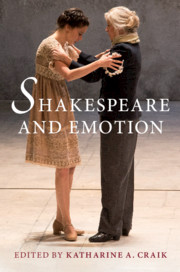Book contents
- Shakespeare and Emotion
- Shakespeare and Emotion
- Copyright page
- Contents
- Figures
- Contributors
- Acknowledgements
- Note on Text
- Introduction
- Part I Contexts
- Chapter 1 Rhetoric
- Chapter 2 Medicine
- Chapter 3 Religion
- Chapter 4 Character
- Chapter 5 Inheritance and Innovation
- Chapter 6 Communities
- Chapter 7 Audiences
- Chapter 8 Acting
- Chapter 9 Bollywood
- Chapter 10 Language
- Chapter 11 Emotional Labour
- Chapter 12 Passionate Shakespeare
- Part II Emotions
- Bibliography
- Index
Chapter 12 - Passionate Shakespeare
from Part I - Contexts
Published online by Cambridge University Press: 01 October 2020
- Shakespeare and Emotion
- Shakespeare and Emotion
- Copyright page
- Contents
- Figures
- Contributors
- Acknowledgements
- Note on Text
- Introduction
- Part I Contexts
- Chapter 1 Rhetoric
- Chapter 2 Medicine
- Chapter 3 Religion
- Chapter 4 Character
- Chapter 5 Inheritance and Innovation
- Chapter 6 Communities
- Chapter 7 Audiences
- Chapter 8 Acting
- Chapter 9 Bollywood
- Chapter 10 Language
- Chapter 11 Emotional Labour
- Chapter 12 Passionate Shakespeare
- Part II Emotions
- Bibliography
- Index
Summary
This essay argues that the traditional (and not just Romantic) association of Shakespeare with nature and passion ties his work to a non-doctrinaire politics and morals. As ‘the poet of nature’, in Dr Johnson’s phrase, Shakespeare is linked to an anti-systematic, open, essentially tolerant worldview. The essay brings this point into sharper focus by recounting how one of the poet’s strangest and most ardent admirers, the twentieth-century French-Rumanian writer E.M. Cioran, understood Shakespeare as an artist fundamentally hostile to philosophy and even to reason itself. For Cioran, Shakespeare, along with kindred authors such as Dostoievsky and Nietzsche, exploded systems and the pretensions of thought. It was Shakespeare’s commitment to the passions and experience, his basic irrationalism, that made his work such a powerful antidote to the murderous and programmatic utopianism that, Cioran believed, had blighted so much of human existence, not least in the twentieth century.
- Type
- Chapter
- Information
- Shakespeare and Emotion , pp. 181 - 196Publisher: Cambridge University PressPrint publication year: 2020

